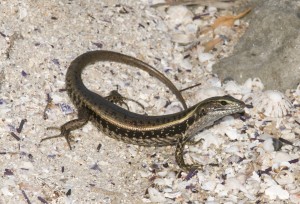Followers of the Lizard Lab blog will have read previous reports about relatively rapid learning in lizards. In those studies we typically focused on males or avoided drawing comparisons between the sexes because either the sample size was limited or the focus of the study was different. In our latest paper we decided the issue could be avoided no longer! We begin by demonstrating that males have better spatial learning ability than females (45.1% male learners vs 22.6% female learners), and we believe this is the first case of sex differences in learning ability in a reptile. (Let me know if we are wrong about this!) Before anyone takes exception to this result, bear in mind it is most likely because males need to search for females and traverse larger areas in their quest to find females. Females have no such constraints, so no need to invest as heavily in spatial cognition when you can divert your resources elsewhere. Smart females, you might say! In the next part of the study we tested for a link between behavioural types (‘personality’) such as boldness, and learning ability. Overall, bold lizards were more likely to learn the spatial task. And now for the rather intriguing result: bold and shy individuals were better at spatial learning than intermediates (bold males: 82% probability of learning, bold females: 57%; shy males: 45% probability of learning, shy females: 20%). This nonlinear association between learning ability and personality is unique and may be linked to alternative reproductive tactics. This really needs to be investigated further.
The full citation: Carazo, P., D.W.A. Noble, D. Chandrasoma, M.J. Whiting. 2014. Sex and boldness explain individual differences in learning in a lizard Proceedings of the Royal Society B: Biological Sciences. Published online 12 March 2014. 01/2014; 281(1782):20133275. DOI:10.1098/rspb.2013.3275
Download the paper from ResearchGate
Here is the abstract:
Understanding individual differences in cognitive performance is a major challenge to animal behaviour and cognition studies. We used the Eastern water skink (Eulamprus quoyii) to examine associations between exploration, boldness and individual variability in spatial learning, a dimension of lizard cognition with important bearing on fitness. We show that males perform better than females in a biologically relevant spatial learning task. This is the first evidence for sex differences in learning in a reptile, and we argue that it is probably owing to sex-specific selective pressures that may be widespread in lizards. Across the sexes, we found a clear association between boldness after a simulated predatory attack and the probability of learning the spatial task. In contrast to previous studies, we found a nonlinear association between boldness and learning: both ‘bold’ and ‘shy’ behavioural types were more successful learners than intermediate males. Our results do not fit with recent predictions suggesting that individual differences in learning may be linked with behavioural types via high–low-risk/reward trade-offs.We suggest the possibility that differences in spatial cognitive performance may arise in lizards as a consequence of the distinct environmental variability and complexity experienced by individuals as a result of their sex and social tactics.
Listen to Dr. Dan Noble discuss the topic of sex differences in spatial learning, and how it relates to personality. And listen to some cool music to boot!


